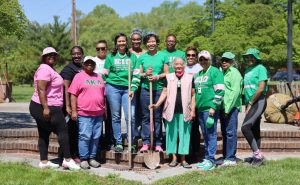Gov. Carney joined DNREC staff, city of Dover workers and volunteers from local business and organizations for an Earth Day cleanup at Mirror Lake in Dover, commemorating a precedent-setting environmental cleanup 10 years ago by DNREC that garnered national acclaim. /DNREC photo
Governor John Carney joined state and city employees ahead of Earth Day today to remove invasive plant species and dead vegetation at Mirror Lake in Dover. The event was organized by the Delaware Department of Natural Resources and Environmental Control and the city of Dover 10 years after a successful environmental cleanup and habitat restoration at the site was undertaken by DNREC’s Watershed Assessment and Management Section and WATAR (Watershed Approach to Toxics Assessment and Restoration) team.
The 2013 cleanup used an innovative carbon technology to sequester (bind) carcinogenic polychlorinated biphenyls (PCBs) and remove them from the ecosystem in Mirror Lake. The work helped to improve the natural beauty of the lake, increase the lake’s ecological function, and made the fish there safer for human consumption.
“The Mirror Lake restoration project was an opportunity for our community to come together to tackle important environmental and water quality concerns,” said Governor Carney. “I want to thank DNREC and the city of Dover’s continued efforts to monitor and improve the health of this beautiful lake.”
“What was accomplished at Mirror Lake, though smaller in scope, was monumental as a springboard for similar projects to be conducted by our WATAR team, and others across the nation, since 2013,” said DNREC Secretary Shawn M. Garvin. “I am proud in knowing that DNREC was an early adopter of this promising remedial technology, and that we now confidently use it in other areas of the state where appropriate to help us continue making gains with water quality and in restoring fish and wildlife habitat.”

Dover Mayor Robin R. Christiansen said, “Mirror Lake speaks to Dover’s civic pride. Over the last decade it has evolved into a beautiful event venue that includes private weddings. We are thankful for the partnership with DNREC and the state of Delaware in achieving it, while being able to maintain the beauty of Mirror Lake for the neighbors and our community.”
With Mirror Lake continuing to rebound from longtime environmental ills as it empties into the St. Jones River, the wetland now plays an important role in improving water quality in the St. Jones Watershed, which spans the southern half of Kent County and Delaware’s capital city, including nearby Legislative Hall and the Tatnall Building housing the Governor’s Office, and DNREC’s downstate campus in the circa 1863 Richardson & Robbins Building which borders Mirror Lake.
The environmental cleanup at Mirror Lake in Dover garnered national acclaim through use of a first-of-its kind activated carbon product called SediMite™. The project also was featured in an article in the scholarly Journal of Environmental Engineering, co-authored by several project participants, including two DNREC scientists. Titled “Full-Scale Application of Activated Carbon to Reduce Pollutant Bioavailability in a 5-Acre Lake,” the article noted that between 2013 and 2018 the project achieved approximately 80% reduction in PCB concentrations in sediment porewater, which is the water trapped between grains of sediment in the bottom of body of water. The study also documented an approximate 70% reduction in PCB concentrations in Mirror Lake’s resident fish.
DNREC scientists are currently working with project partners to develop a plan for a comprehensive 10-year post-remediation study of Mirror Lake carbon project, to include sediment, porewater, surface water and fish tissue sample analysis. Results from the study are planned to be released concurrently with DNREC previously planned fish tissue monitoring of the entirety of the St. Jones River system in the fall of 2024.
About DNREC
The Delaware Department of Natural Resources and Environmental Control protects and manages the state’s natural resources, protects public health, provides outdoor recreational opportunities and educates Delawareans about the environment. The DNREC Division of Watershed Stewardship develops and implements innovative watershed assessment, monitoring and implementation activities. Division of Waste and Hazardous Substances ensures Delaware’s wastes are managed to protect human life, health, safety and the environment. For more information, visit the website and connect with @DelawareDNREC on Facebook, Instagram, Twitter or LinkedIn.
Media Contacts: Nikki Lavoie, nikki.lavoie@delaware.gov; Michael Globetti, michael.globetti@delaware.gov